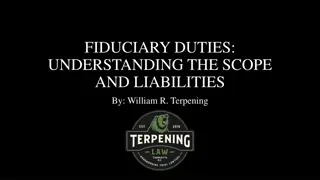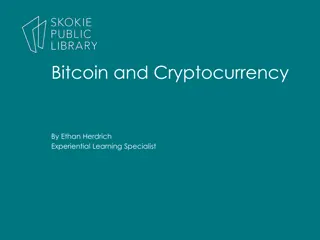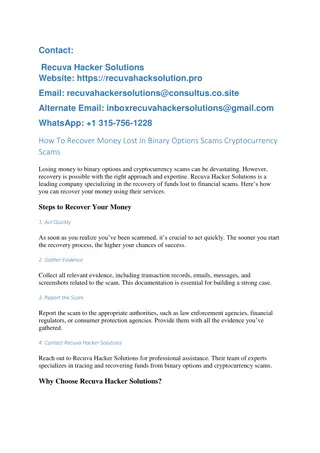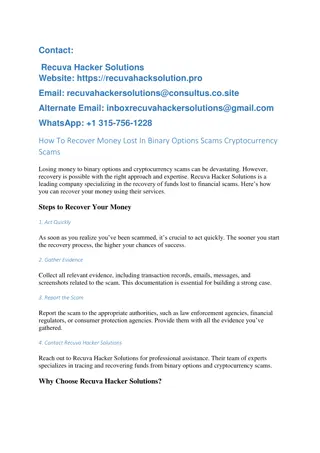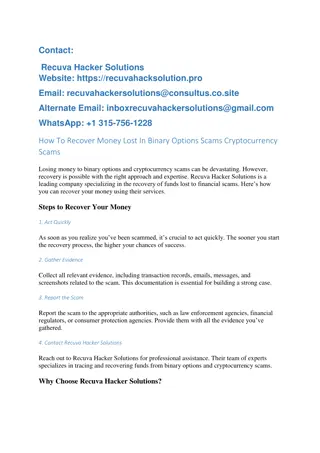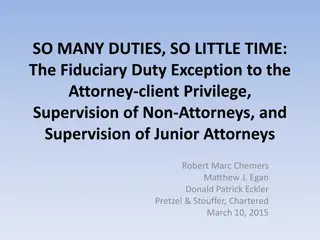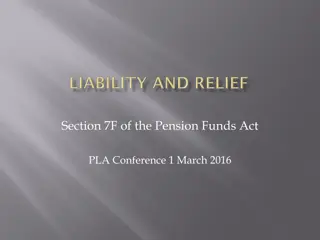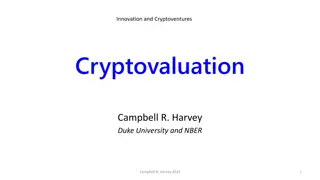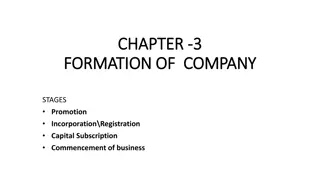Understanding Fiduciary Investment in Cryptocurrency
This content delves into the intersection of fiduciary investing and cryptocurrency, focusing on Bitcoin as a viable asset. It discusses the responsibilities of fiduciary investors under the Uniform Prudent Investor Act and explores the caution advised by the DOL regarding adding cryptocurrency options to investment plans. The act highlights the trustee's duty to invest prudently while considering the overall investment strategy and risk-return objectives of the trust. It emphasizes the trustee's flexibility to invest in various assets based on the trust's goals.
Download Presentation

Please find below an Image/Link to download the presentation.
The content on the website is provided AS IS for your information and personal use only. It may not be sold, licensed, or shared on other websites without obtaining consent from the author. Download presentation by click this link. If you encounter any issues during the download, it is possible that the publisher has removed the file from their server.
E N D
Presentation Transcript
CRYPTO & FIDUCIARY INVESTING October 28, 2022
Bitcoin & Crypto Most of this presentation will focus on Bitcoin as an investment for fiduciary investors. Bitcoin remains the largest cryptocurrency in terms of market capitalization. Relatedly, it is the easiest for investors to access. We should also note that we are about one year removed from Bitcoin s peak. Nov. 18, 2021: $67,550. Oct. 26, 2021: $20,250. Roughly a 70% decline. In contrast, S&P 500 has lost about 15% in this period. 2
Fiduciary Investors Broadly speaking, fiduciary investors invest on behalf of others and are subject to fiduciary duties. Most of this presentation will focus on trustees and their duties under the Uniform Prudent Investor Act. Some ancillary discussion of other aspects of trust law and ERISA, which governs 401(k) plans and other retirement plans of private employers. 3
DOL Release March 2022 DOL cautions plan fiduciaries to exercise extreme care before they consider adding a cryptocurrency option to a 401(k) plan's investment menu for plan participants. The DOL noted several risks associated with investing in crypto. For example, investment in a cryptocurrency is highly speculative and cryptocurrencies have been subject to extreme price volatility. [P]lan fiduciaries ... should expect to be questioned about how they can square their actions with their duties of prudence and loyalty in light of the risks described above. 4
UNIFORM PRUDENT INVESTOR ACT 5
UPIA 2(a) A trustee shall invest and manage trust assets as a prudent investor would .... In satisfying this standard, the trustee shall exercise reasonable care, skill, and caution. 6
UPIA 2(b) A trustee's investment and management decisions respecting individual assets must be evaluated not in isolation but in the context of the trust portfolio as a whole and as a part of an overall investment strategy having risk and return objectives reasonably suited to the trust. 7
UPIA 2(e) A trustee may invest in any kind of property or type of investment consistent with the standards of [the UPIA]. Official Comment. The Act impliedly disavows the emphasis in older law on avoiding speculative or risky investments. Low levels of risk may be appropriate in some trust settings but inappropriate in others. It is the trustee's task to invest at a risk level that is suitable to the purposes of the trust. 8
UPIA 3 A trustee shall diversify the investments of the trust unless the trustee reasonably determines that, because of special circumstances, the purposes of the trust are better served without diversifying. 9
UPIA 8 Compliance with the prudent investor rule is determined in light of the facts and circumstances existing at the time of a trustee's decision or action and not by hindsight. 10
Remedies UTC 1002(a)(1): breaching trustee liable for the amount required to restore the value of the trust property and trust distributions to what they would have been had the breach not occurred. UTC 707(b) authorizes removal of a trustee for (among other reasons) serious breach of trust and persistent failure of the trustee to administer the trust effectively. 11
BTC & UPIA 12
Applying UPIA to BTC A trustee may invest in BTC if a prudent investor would do so. Courts should analyze BTC investments as part of the entire trust portfolio, rather than in isolation. Trustees must diversify this trust portfolio. Characterizing BTC as speculative or volatile does not make it per se imprudent under the UPIA. 13
Safe (But Boring) Answers Trustees routinely pursue balanced portfolios split between stocks and bonds. Trustees should be able to add a small amount of BTC to such portfolios prudently. 14
Why Small? BTC remains relatively small compared to the U.S. stock market. BTC s current market capitalization is $387 billion. S&P 500 is roughly $30 trillion. If BTC were a public corporation, it would be just outside the top 10 (comparable to Walmart). Even at its highest market capitalization $1.26 trillion, BTC would be the 4th largest publication (comparable to Amazon). 15
Tentative Conclusion Courts could analyze BTC like stock in a single, large corporation. BTC s one-year decline of 70% is dramatic but not unheard of in the world of large capitalization stocks. For example, Meta Platforms has fallen by roughly the same percentage over the past. 16
SPECIAL CASES AND DEEPER ANALYSIS 17
Making the Case for Crypto Liability would arise only in falling markets. Still, courts should analyze decisions as of the time made. What factors should a trustee focus on? potential for extraordinary growth diversification within a portfolio Professional trustees typically have investment policy statements, which should address any investment in crypto. 18
UPIA & Financial Theory BTC s size is comparable to a large public corporation (Walmart, Amazon). Beyond diversification, the financial theory underlying UPIA may have limited application to BTC. BTC s valuation cannot turn on a fundamental analysis. There is no underlying business. There is no cash flow. Capital asset pricing model (CAPM) may have limited (or no) application because BTC is historically uncorrelated with larger financial markets. 19
Waiver of Diversification UPIA is a set of default rules that the settlor can alter. A common alteration would waive the duty of diversification. Could a trustee invest 100% in BTC if the trust document waived the duty of diversification? Trustee would still need to defend the investment as satisfying the overall duty of prudence. 20
Beyond Bitcoin The analysis above could apply to Ether (subject to its lower market capitalization). Trustees would likely need to bring a high level of expertise and confidence before investing in other cryptocurrencies. 21




